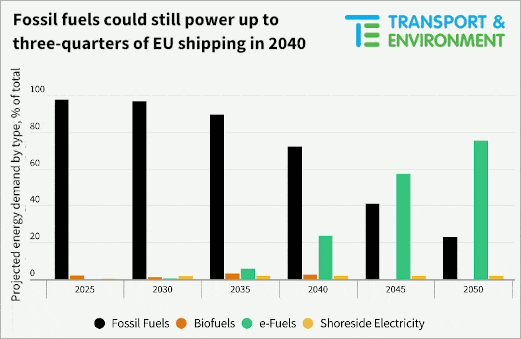
After 2050, the shipping sector will be
still dependent on fossil fuels, which will represent
still up to 28% of the demand for marine fuels in the sector,
And that means that the shipping industry almost
It will certainly not respect the objective of limiting the
global warming at 1.5 degrees. This is highlighted by a new study by
Transport & Environment (T&E), a European organisation that has
the objective of promoting the reduction of the impact of transport
on the environment, observing that, if last April the European Union
has approved rules on the decarbonization of shipping that are
so far the most ambitious in the world
(
of
18
April 2023), rules that among other things establish that by
2034 the sector must use a share of e-fuel equal to 2% of
fuels consumed, however this is not
Sufficiently and until 2040 fossil fuels will continue
accounting for three quarters of the energy needs of transport
European seafarer.
The T&E study finds that if the current rules provide for
whereas by 2035 6% of the maritime transport sector
will run on green electric fuel and this
percentage will rise to 24% by 2040, however for
make sure that the sector decarbonizes in time, the share of
Green e-fuel must be at least 18% by 2035 and
by 85% by 2040, to which must be added the effect of
important energy efficiency measures.
"Last year - commented Alex Springer, analyst for
T&E's shipping sector - the EU has completed a
Major step forward in tackling carbon emissions
of ships introducing the world's first fuel strategy
greens for maritime transport. But, in the midst of a crisis
climate, what it asks of shipping companies is not
sufficient. The EU's failure to reach zero emissions
of shipping by 2050 puts the entire Green Deal at risk. The
European policymakers need to be bolder and
Review the objectives immediately after the next European elections
year'.
